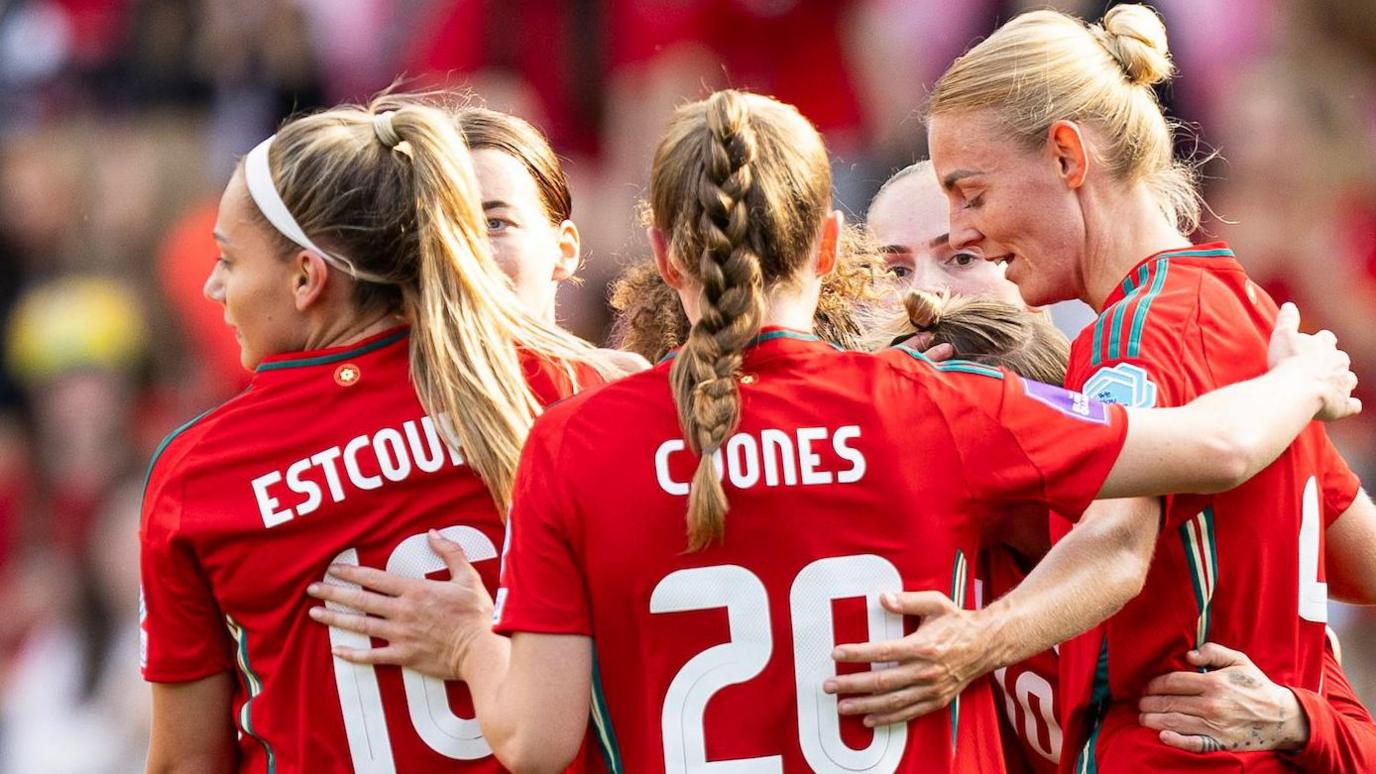Wales continue on tough path to Euro qualification

Wales have never appeared at a major women's tournament
- Published
Wales women’s bid to reach a first major tournament continues with the European Championships play-off draw on Friday, 19 July in Switzerland.
Rhian Wilkinson’s side won their qualification group and will be seeded for the draw after winning four and drawing two of their qualification games.
But what have we learned from Wales’ campaign so far? BBC Sport Wales examines Wales’ 2024.
Winning their group, but still tough to qualify
For Wales, despite winning their qualification group – and earning promotion back to League A of the Nations League – it is still a tough route to qualify for a first major finals.
The women’s game has not followed the men’s in expanding the tournament from 16 to 24 teams, so Wales are still four games away from securing their dream.
Wales will be seeded for the draw, which takes place at 12:00 BST and will face a team that finished second or third in League B, meaning they will play one of Turkey, Croatia, Hungary, Bosnia and Herzegovina, Slovakia or Azerbaijan, with the first leg away on Friday, 25 October, before the return match at Cardiff City Stadium on Tuesday, 29 October.
Should Wales advance – and they will be favourites to do so – they will then face the winner of a League A v League C play-off pairing.
Wales are more likely to face a daunting game with a League A side, with Sweden, Norway, Austria, Belgium, Finland, Czechia, Republic of Ireland or Poland their potential foes.
The potential opponents from League C are Slovenia, Romania, Belarus, Greece, Albania, Luxembourg, Montenegro or Georgia.
A pairing with Norway would certainly be interesting for Wales, with the former World Cup winners managed by Gemma Grainger, who left her post with Wales to manage Norway.
With several Wales players disappointed by Grainger's decision, being paired with Norway would add an extra spice to the clash.
Should Wales reach the play-off finals, they would host one of those sides on Friday, 29 November, before an away game on Tuesday, 3 December.
The Nations League draw, where Wales will learn their League A opponents for 2025-26, takes place on Thursday, 7 November.
Highlights: Wales 2-0 Kosovo - Jess Fishlock claims scoring record
Wilkinson’s tenure begins well
So far, so good, for Wilkinson after her surprising appointment as national team coach.
With Grainger’s resignation coming out of the blue, Wilkinson was the unanimous choice to replace her, taking her first job in management since departing Portland in 2022.
The 42-year old led Portland to the 2022 NWSL Championship, but resigned following an investigation into a relationship with a player.
Wilkinson was cleared of any wrongdoing and tackled her past head on in her opening press conferences as Wales boss, insisting she was ready to move on from the “trauma".
While Wilkinson’s appointment was greeted with a mixed reaction by the Wales players – who it should be added, were a mixture of sad and furious at Grainger’s departure – the former Canadian international has made a strong impression as Cymru coach.
Playing with a more expansive style than either Grainger or previous boss Jayne Ludlow, Wilkinson has proven so far to be tactically flexible and has taken the chance to give as many players as possible playing minutes.
Wilkinson has moved to Wales to live and is fully embracing her role and having a coach of her calibre could be key in the knockout stages as Wales attempt to create history.
Jess Fishlock: Watch her best Wales goals
Fishlock breaks another record
Another campaign, another record broken by Jess Fishlock, now the all-time leading goalscorer for Wales.
Fishlock broke Helen Ward's record by scoring her 45th Wales goal in their 2-0 win over Kosovo at Parc y Scarlets.
The 38-year old Seattle Reign player remains Wales' most-important player and shows no signs of slowing down despite having represented her country 154 times.
Fishlock has started 152 of those 154 games and played in more than 66% of Wales women's all-time recorded internationals.
Still Wales' best player, Fishlock is every bit as important to the women's side as Gareth Bale was to the men's.
Despite her accolades, Fishlock still received criticism on social media after the Football Association of Wales posted a graphic showing her ahead of Bale and Ian Rush on the list of all-time Welsh scorers.
"To everyone in my comments, going out of their way to say a graphic of my achievements is disrespectful to male players," she wrote.
"Not a single person is comparing our careers, except you.
"We are one nation, playing one sport."
A change of captain... who will get the armband?
After nine-years of captaining her country, Sophie Ingle opted to stand down as Wales skipper after Wales' 4-0 opening round win over Croatia.
In a decision Wilkinson described as "selfless," Ingle, the Women's Super League's all-time appearance leader, decided she would like one of her team-mates to "have their chance," of leading Wales.
Wilkinson took the change of captaincy as an opportunity to share around the honour, with Ingle, Fishlock, Angharad James, Hayley Ladd and Ceri Holland all wearing the armband.
Wilkinson has been clear that she sees several leaders within the group, but has vowed to name a permanent successor to Ingle before Wales' play-off games.
It is difficult to look beyond James, the only player to wear the armband twice under Wilkinson, as the likely permanent successor.
One of Wales' best players, with over 100 international caps, James is universally popular with her team-mates and FAW officials alike and as a fluent Welsh speaker often appears at media events.
It would be a big surprise if James is not named as Wilkinson's permanent skipper with the potential chance to lead Wales to a first major finals in 2025.